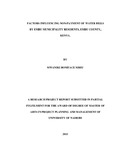| dc.description.abstract | Non-payment or delays in payments of water bills by customers to Water Service Providers
(WSPs) resulting to decline in revenues, for water supplied to them has been cited as a major
concern for sustainable, effective and efficient water supply and management in Kenya. For
instance, Embu Water and Sanitation Company (EWASCO) had a collection efficiency of
82% in the year 2011 and for the period from the year 2008 to 2012, the WSPs in Embu
County had arrears amounting up to 28.26% of the total bills charged. Thus, WSPs are unable
to honour their statutory obligations of paying for raw water. Consequently, the Water
Resource Management Authority has been experiencing a serious financial shortfall. Further,
it would be very difficult for the country to achieve the Vision 2030, since water is vital for
economic development. This state of affairs ignited the desire to conduct the present study,
whose objective is to evaluate the factors that contribute to the non-payment of water to
EWASCO by consumers in Embu municipality. This study, which used descriptive design,
was conducted to address the issue of payment for water by consumers. The target population
was the 8,836 people served with water by EWASCO in Embu County. The study used
Fischer method to obtain a sample size of 400 and the respondents were selected using
stratified random sampling. A structured questionnaire was administered to the respondents
during data collection. A pretesting was conducted to test the research instrument for
reliability and validity before its administration after which data was collected. The collected
data was checked for errors and then analyzed using descriptive analysis and correlation
analysis. The study found out that the billing system affected payment of water negatively,
revenue collection system was effective and did not have any negative effects on the water
payment by water users; the cost of water was exposed as one of the main reasons why the
water users failed to pay water promptly, and the consumer behavior, contributed immensely
to the failure to pay water bills on time. The study recommends that, EWASCO should
strengthen its water billing payment policies; invest more in information technology; enhance
its revenue collection systems of modern technology in paying water bills; the WSP should
organize forums to inform the water consumer of the need to pay for water service and why it
is necessary and EWASCO would need to sensitize the water consumer on the institutional
and legal framework on water service delivery. The study findings will benefit among others
Water Service Providers, Water Resource Management Authority, the water sector players in
the country, academicians and researchers. The findings of the study would help develop
ways and means of improving the over-all performance of the water sector. | en |

